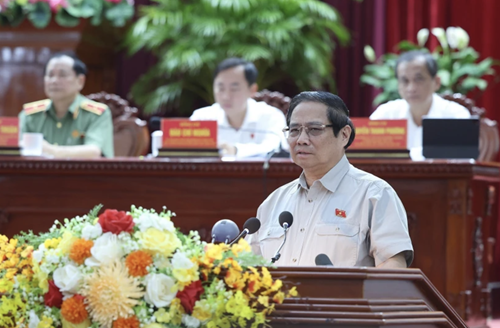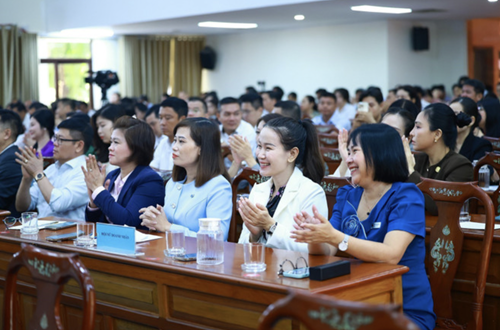His remarks came ahead of the 15th National Assembly’s 9th session, set to be the term's most significant and document-heavy.
    |
 |
|
PM Pham Minh Chinh speaks at the meeting |
The upcoming session will focus on amending the Constitution and related laws to streamline the political system and introduce a two-tier local administration model for a leaner, more efficient, effective, and people-centric governance structure. Multiple laws will be revised to eliminate institutional bottlenecks, unleash productive capacity, and pool all available resources for national development. The ultimate goal is to build an independent and self-reliant economy while actively and effectively engaging in global integration.
The N.A. will also deliberate on key mechanisms and policies, including establishing international financial centers, promoting integration, supporting private sector growth, advancing social housing, and strengthening supreme oversight.
The PM addressed public concerns regarding the US new tariff policies, social housing, and gold market management. He assured voters that many other issues will be collected and submitted to relevant authorities for consideration.
Since early this year, the Government has directed ministries, agencies, and localities to fully follow the 13th National Party Congress’s Resolution, along with resolutions and conclusions of the Party Central Committee, the Politburo, the N.A., and the Government. Under the Party’s leadership and with the support of the people and businesses, Vietnam has made significant socio-economic strides in the year’s first four months.
Notably, Vietnam has achieved the highest annual growth rate since 2020, with macroeconomic stability, controlled inflation, and major economic balances secured. Total trade turnover surpassed 202 billion USD, up 13.7% year-on-year, with a trade surplus of 3.16 billion USD.
State budget revenue exceeded 721 trillion VND (28.84 billion USD), or 36.7% of the full-year estimate, rising 29.3% year-on-year. Foreign direct investment hit 10.98 billion USD, up 34.7%, while actual disbursed capital reached 4.96 billion USD, up 7.2%, the highest Q1 figure over the past five years. The total retail sales of goods and consumer services grew by 9.9%, while foreign arrivals rose by 29.6% to over 6 million.
    |
 |
|
Can Tho voters at the meeting |
Social welfare has seen tangible gains, with improved living standards and a firm commitment to leaving no one behind. Vietnam’s happiness index in 2025 rose eight places to rank 46th globally, second only to Singapore in Southeast Asia. Many prestigious international organizations continue to praise Vietnam’s economic resilience and outlook.
To achieve at least 8% growth this year and double-digit growth thereafter, PM Chinh committed to realizing the Politburo’s resolutions on advancing sci-tech, innovation, digital transformation, and global integration. This includes resolving stalled or underperforming projects, including those in Can Tho, to unlock regional potential.
Can Tho was urged to focus on public investment, a cohesive infrastructure system within the Mekong Delta’s overall framework, and closer coordination with other Mekong Delta localities for mutual development.
The leader suggested restructuring the local economy, with a focus on boosting industrial and service development, especially healthcare and education services. Diversifying markets, products, and supply chains to promote exports, reducing administrative procedures, decentralizing authority, and strengthening flood response measures were also highlighted as critical steps.
Source: VNA